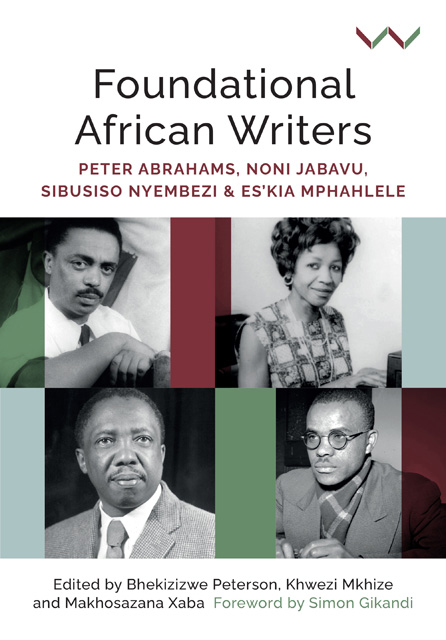Book contents
- Frontmatter
- Contents
- List of illustrations
- Foreword
- Acknowledgements
- Tribute to Professor Bhekizizwe Peterson
- Introduction
- Part I Remapping and Rereading African Literature and Cultural Production
- Part II South Africa and Fugitive Imaginaries
- Part III In the Eye of the Short Century: Diaspora and Pan-Africanism Reconsidered
- Contributors
- Index
18 - Mphahlele’s Writing in the Whirlwind
Published online by Cambridge University Press: 01 September 2022
- Frontmatter
- Contents
- List of illustrations
- Foreword
- Acknowledgements
- Tribute to Professor Bhekizizwe Peterson
- Introduction
- Part I Remapping and Rereading African Literature and Cultural Production
- Part II South Africa and Fugitive Imaginaries
- Part III In the Eye of the Short Century: Diaspora and Pan-Africanism Reconsidered
- Contributors
- Index
Summary
In his second autobiography, Afrika, My Music − a follow-up to his 1959 classic Down Second Avenue − Es’kia Mphahlele offers an account of his 1957 departure from South Africa, his 1977 return and the intervening twenty years in exile. The last eleven years of this period were spent primarily in the USA: he moved first to pursue his doctoral studies at the University of Denver, where, after less than a year in Zambia, he returned to begin his university teaching career and then went on to Philadelphia, where he taught for almost three years at the University of Pennsylvania. It was during the last few years of exile that he formulated his signature phrase, ‘the tyranny of place’, articulating his compulsion to return to the land of his birth despite the apartheid state’s persistent dispossession of a black majority and its violent suppression of a rising insurgency. After a brief but invigorating return to South Africa to address the inaugural conference of the Black Studies Institute in 1976, Mphahlele applied for a passport to permanently relocate. He would reveal years later in Afrika, My Music how, in the moment, he considered his options while awaiting government authorisation for his and his wife Rebecca’s resettlement. Amongst the possibilities was not to return but rather to stay and do battle where he stood: ‘I could seek to enlist for the black American cause’, he contemplates. But ‘to fight a cause you’ve got to feel its history and its future in your blood and bones. And the common pangs and joys, the crossroads and forkways of blackness? Yes. Time enough to learn and feel them.’ This textured language takes seriously the responsibilities of political involvement in the USA. But, for Mphahlele, who felt the call ‘of having your shadow noticed’, the tyranny of place and the attendant tyranny of time outweighed both the prospect of engaging in American racial politics and the political tyranny of the white minority regime back home. He ended his two decades of exile immediately upon receiving permission to re-enter the land of his birth.
- Type
- Chapter
- Information
- Foundational African WritersPeter Abrahams, Noni Jabavu, Sibusiso Nyembezi and Es'kia Mphahlele, pp. 397 - 416Publisher: Wits University PressPrint publication year: 2022



